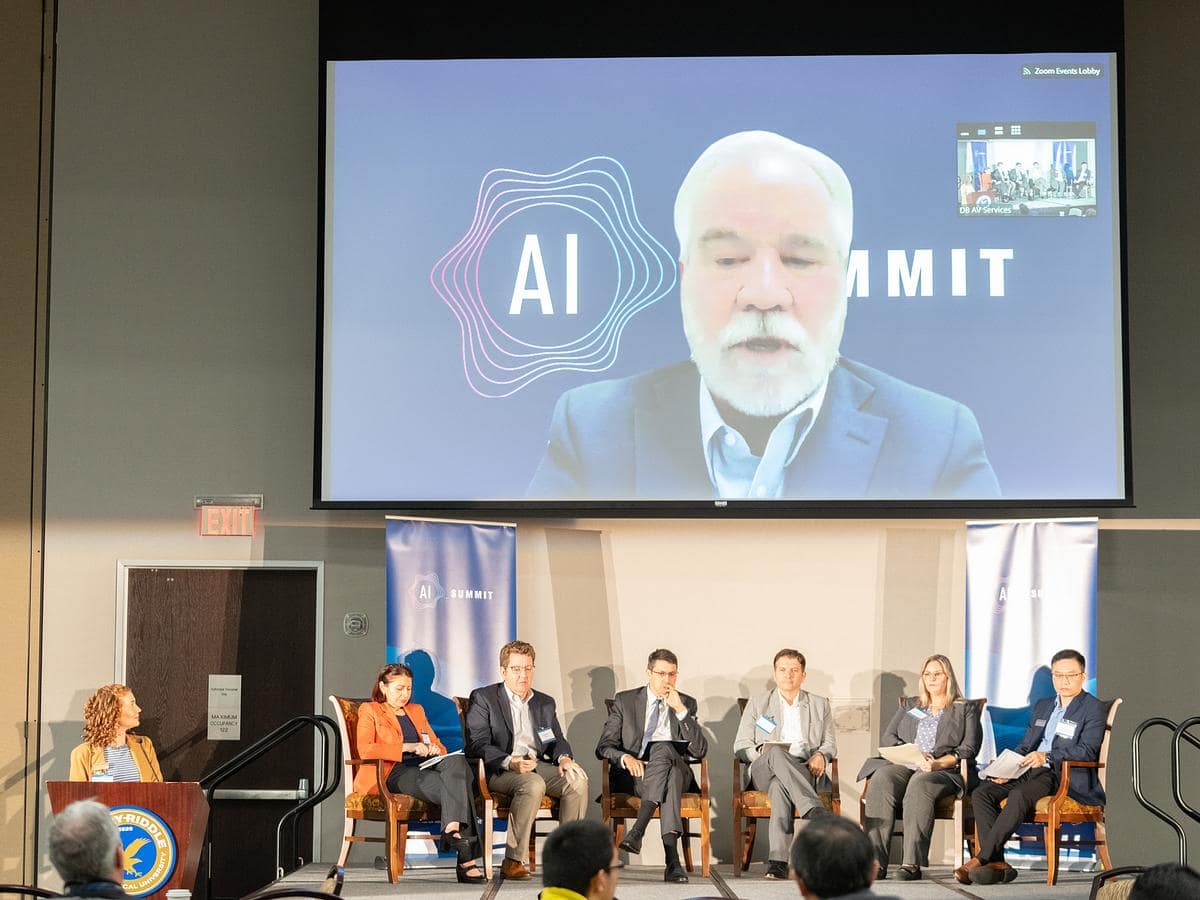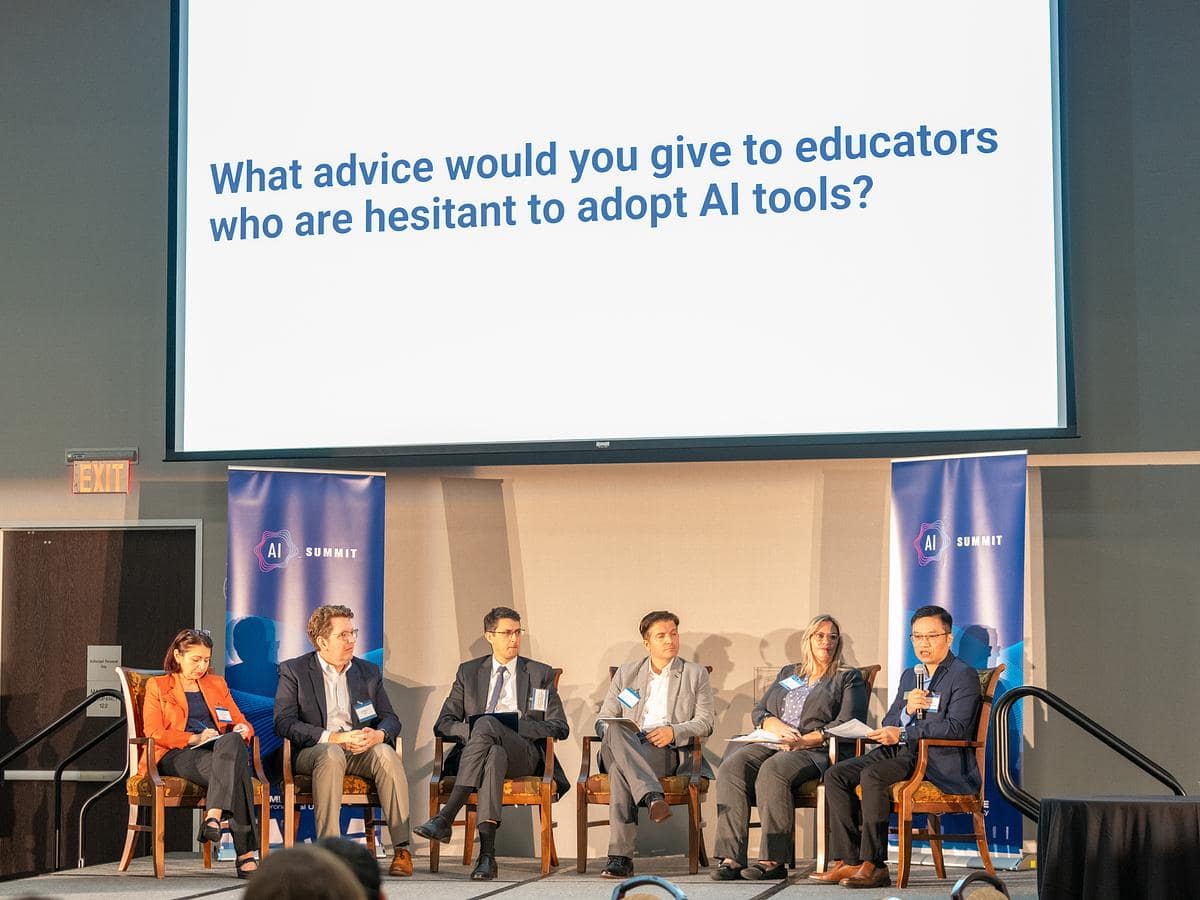Embry-Riddle’s Inaugural AI Summit Sets Agenda for Rapidly Evolving Technology

Embry-Riddle Aeronautical University’s first AI Summit showcased innovative artificial intelligence initiatives in aviation and aerospace research and higher education that are being explored by the university’s expert faculty and staff.
Hosted by the Provost’s Office, the one-day event took place Nov. 19 at the Henderson Welcome Center on the Daytona Beach Campus. Participants from the Prescott and Worldwide campuses joined in the conversation through an online feed.
“Whether you are focused on expanding our capacity as the global leader in aviation and aerospace research, or you are advancing the cutting-edge of instruction while leveraging AI in your classrooms, or you are supporting our students outside the classroom, I think it’s really important that we continue to have these conversations around artificial intelligence,” said Dr. Kelly Austin, the university’s senior vice president of academic affairs and provost.
Several faculty members presented research briefs focused on the impacts of AI in the aviation and aerospace industries. Presenters included Dr. M. Ilhan Akbas, associate professor of Electrical Engineering and Computer Science; Dr. Sean Crouse, assistant professor of Spaceflight Operations; Dr. Robert Joslin, associate professor of the Practice of Aeronautics; Dr. Hong P. Liu, professor of Mathematics; Dr. Jianhua Liu, associate professor of Electrical and Computer Engineering; and Dr. Burak Cankaya, associate professor of Decision Science and Analytics.

Dr. Dothang Truong, professor and associate dean of the School of Graduate Studies, participates in a panel discussion titled “Navigating the Frontier: Innovations and Insights in AI Research and Education” at Embry-Riddle’s first AI Summit.
Presentations on the impacts of AI in the classroom and workplaces were given by Dr. Rahman AlMomani, assistant professor of Data Science and Mathematics; Joshua Caulkins, director of the Center for Teaching and Learning Excellence(CTLE) on the Prescott Campus; Dr. Amy Cicchino, associate director for the CTLE on the Daytona Beach Campus; Dr. Dean Goon, dean of Academic Innovation; Dr. Alyssa DeNaro, senior generative AI solution specialist; and Becky Vasquez, vice president and chief information officer.
“AI is impacting how we teach, how students are learning and research,” Vasquez said. “Really every industry that our students are entering, AI is touching.”
One of the summit's highlights was the panel discussion, “Navigating the Frontier: Innovations and Insights in AI Research and Education,” which featured faculty members from the Daytona Beach, Prescott and Worldwide campuses. The panel included Dr. Cihan Aydiner, associate chair in the Department of Emergency, Disaster and Global Security Studies; Dr. Tanya Corbin, chair of the Department of Emergency, Disaster and Global Security Studies; Dr. Jon Haass, professor of Cyber Intelligence and Security; Dr. Maria Petrescu, associate dean of Innovation; Dr. Joao Souza Dias Garcia; assistant professor of the School of Graduate Studies; Dr. Brent Terwilliger, associate professor of Aeronautics; Dr. Dothang Truong; professor and associate dean of the School of Graduate Studies; and Dr. Bryan Watson, assistant professor of Systems Engineering.
Terwilliger discussed how AI allows researchers to find relevant sources and scan databases more quickly.
“AI tools are really transforming research,” he said.
Haass said AI is useful in quickly turning a “mountain of data into actionable information.” Truong described how AI can be leveraged for predictive modeling in aviation safety research.
The panelists also discussed AI's impacts on teaching and assessment practices and the challenges and benefits of using AI in the classroom.
“AI is going to be important, and our students are going to have to master it,” Haass said.
Panelists agreed that the key was using AI to support learning while ensuring students continued to be creative, think critically, and learn the basics.
“It’s not a question of do we use AI,” Truong said. “It’s a question of how do we use it effectively and properly.”
The panelists, who represented several colleges, agreed that AI would have a transformative effect. It was important, however, for the university to continue to explore safety, security and ethical considerations regarding the rapidly evolving technology.
“I’m confident this AI summit will whet our appetite for more research collaboration and inspire us for continued research as we forge ahead into this exciting future,” said Dr. Bert Zarb, vice provost for academic affairs.

 Melanie Stawicki Azam
Melanie Stawicki Azam